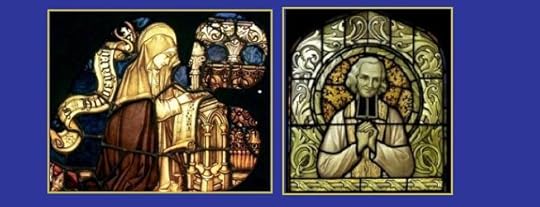Carl E. Olson's Blog, page 182
November 27, 2012
“Where Are The Catholics?”
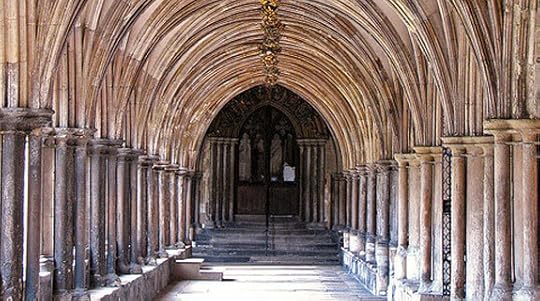
“Where Are The Catholics?” | Fr. James V. Schall, S.J. | Catholic World Report
Is Christianity the measure of modernity or is modernity the measure of Christianity?
On
the morning after Thanksgiving, I was driving over to Frederick, Maryland with
one of my nephews. On the car radio, he was listening to a talk radio program
from WMAL in Washington. The host of the program was a man who described
himself as a conservative Jew. He was talking of the increasing religious
persecution within the United States. Several times throughout the program he
pointed out that it was the Catholics who are more and more being singled out
and discriminated against. The First Amendment on religious freedom seems
almost a dead letter when it comes to Christians in general and Catholics in
particular.
The
host noted that if any similar criticism is directed toward other religious
groups and religions, especially Islam, the whole world knows about it. And in
some cases the world is threatened. Churches are burned in Islamic countries,
Christians killed, and nothing much is said either by our government or in the
press. Almost the only voice that seems systematically to defend a Catholic
position, he remarked, is that of Bill Donohue of the Catholic League. The host
went on to wonder why this silence is the case. Part of it, he thought, is
because Catholics themselves do not seem to care too much, or else they are not
aware of the dimensions of the issue. They think it will just go away.
Many
writers and voices have pointed out that the present administration is by all
odds the most anti-Catholic regime in this country’s history. That did not
prevent some 50 percent of Catholics from voting for it. But that may be a clue
about the problem. Often the leaders of those measures and decrees most against
officially stated Catholic positions are formulated and carried out by those
who are Catholics. Several other writers have argued that so long as these
high-profile Catholics carry out anti-Catholic policies and remain in
apparently good standing in the Church, many Catholics will conclude that,
whatever the noise about these issues, it must be all right to be a Catholic
and take positions contrary to what the bishops and Church seem to hold.
Why
Catholics do not defend themselves against such attacks on their religion and
their place in public life has long puzzled many sympathetic citizens.
November 26, 2012
What does it mean to be “pastoral”?
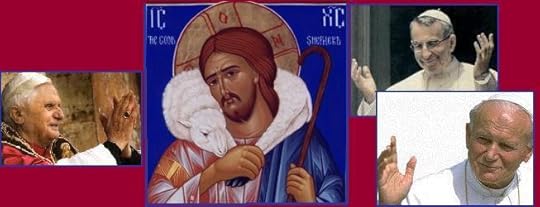
by Fr. Kenneth Baker, S.J. | Homiletic & Pastoral Review
The term “pastoral” comes from the Latin, pastor, meaning “shepherd,” and thus refers to the work and concern of the shepherd for his sheep.
In the current ecclesiastical jargon, what is the meaning of the word
“pastoral”? The term was frequently used to describe Pope John Paul I
during his very short reign. He was said to be a “pastoral” pope,
presumably because he was close to his people in Venice, and in his
first diocese, Vittorio Veneto. The term also seemed to stand in
opposition to “curial,” since he had never been a part of the Roman
Curia, nor had he been a Vatican diplomat, such as his four
predecessors, Paul VI, John XXIII, Pius XI, and Pius XII.
Again, in the sad weeks between the sudden death of John Paul I, and
the election of Blessed John Paul II, much was said and written about
the need for a “pastoral” Pope. When certain journalists, theologians
and ecclesiastics stress the need for a “pastoral” Pope, what do they
really mean?
The term “pastoral” comes from the Latin, pastor, meaning
“shepherd,” and thus refers to the work and concern of the shepherd for
his sheep. Jesus referred to himself as “the Good Shepherd,” and to
those who believe in him, as his “sheep,” so the terminology is founded
on the very words of Christ. Timothy and Titus, 1 and 2, are known as
the “pastoral epistles” since they present a series of
practical directives for the proper pastoral care of the Christian
communities at Ephesus and Crete. “Pastoral theology” includes
everything connected with the priestly ministry to the faithful; it is a
practical science which tries to apply the revealed truths of our
faith, and the directives of the Magisterium, to the problems of daily
living. Thus, the pastoral priest, according to this understanding, is a
practical man who instructs and helps his people lead a fully Christian
life so that they can finally attain eternal salvation.
Transformative Preachers: Hildegard of Bingen and Jean Marie Baptiste Vianney
Transformative Preachers: Hildegard of Bingen and Jean Marie Baptiste Vianney | Dn. Bill Smith | Homiletic & Pastoral Review
Hildegard and Vianney were transformative preachers, catalysts for change.
Every preacher faces a choice. One can preach stability, promoting
the existing spiritual situation of the congregation. This is preaching
what the congregation desires to hear: they are doing well and they are
headed for salvation. On the other hand, one can decide to preach
transformation, promoting a higher level of spirituality for a
congregation so it can recognize the need to move closer to the Triune
God. Most congregations do not like to hear preaching that tells them
to change, making them uncomfortable with the lives they lead.
Transformative preaching takes courage and skill. A quick review of the
preaching lives of two historical preachers might put this concept into
better focus.
On the surface, there are few preachers less alike than St. Hildegard
of Bingen and St. Jean Marie Baptiste Vianney. Hildegard of Bingen was
a female aristocrat, abbess, and mystic, who was comfortable with Pope
Eugenius III, Saint Bernard of Clairvaux, and the Holy Roman Emperor,
Frederick Barbarossa. Jean Vianney was a male of peasant stock who
served as a simple parish priest for forty-one years, in the tiny French
hamlet of Ars, where he was comfortable with members of his
congregation, peasant farmers and shopkeepers. If that is not enough
diffusion, they lived eight centuries apart in totally different
historical, social, and political milieus.
This paper argues that both Hildegard and Vianney were transformative
preachers, catalysts for change. Hildegard broke new ground simply by
her presence in what was, and is, in many cases, a “man’s world.”
Vianney broke new ground by living his life as a “sermon of humility” in
the Age of Enlightenment, when humanity had cast aside spiritual values
for a life ruled by science and reason. Hildegard and Vianney stand
out as heroic preachers, whose lives need to be studied for their
relevance today.
Hildegard of Bingen (1098 – 1179) was born in present day Germany,
the tenth child of a medieval knight and his lady. She was called to
her vocation through visions from God commencing in her early youth.
Edwards indicates that “Hildegard was precociously religious, having her
first visionary experience before she was five.” 1
Eventually her visions directed her to write down what she had
received. “While she was writing, her project came to the attention of
Pope Eugenius, who read what she had done and commanded her to finish
the work.” 2
Using the Pope’s authority, she skillfully expanded it to preaching
and, in 1160, Hildegard began preaching publicly in Trier, and other
cities along the Main River, a tributary to the Rhine.
Some seven centuries later, Jean Marie Baptiste Vianney (1786 – 1859)
followed in the preaching footsteps of Hildegard. While there is no
evidence he received dramatic visions prior to his ordination, we can
estimate the influence of his calling to preach by measuring the
perseverance he exhibited in becoming a priest, and in his realizing
that preaching was a critical characteristic of his vocation.
November 24, 2012
Christ the King deserves our praise, obedience, and adoration
A Scriptural Reflection on the Readings for Sunday, November 25, 2012, The Solemnity of Christ the King | Carl E. Olson
Readings:
• Dan 7:13-14
• Ps 93:1, 1-2, 5
• Rev 1:5-8
• Jn 18:33b-37
“Would Jesus feel at home among the opulence of The
Vatican?” The question was put to me recently after I’d written defending the
Church’s ownership of cathedrals, churches, and artwork.
My article, in turn, was in response to remarks made by a
professional baseball player—a fallen away Catholic, it turns out—who had
visited the Sistine Chapel and later remarked to a reporter: “They could sell
all those things, auction them off and probably feed half that world's starving
population. There is that much wealth stored in the Sistine Chapel. For it just
to be sitting there I think is a crime.”
There are numerous flaws with such myopic thinking,
including the athlete failing to recognize that no other Christian group in the
world operates as many charitable organizations, orphanages, schools,
hospitals, hospices, and shelters as does the Catholic Church. And what about
his multi-million dollar contract, paid for by fans coming to watch grown men
throw and hit baseballs in huge, expensive stadiums?
Yet, if the stadiums and the teams were sold, what then? Are sporting events
evil? Is it wrong to make a good living being an athlete? Of course not.
Which brings up a point directly related to this great feast
day: cathedrals, churches, and works of art were created over the course of
many centuries as essential features of the Church's worship of Jesus Christ,
who is the King of kings. Today’s reading from the opening chapter of The
Apocalypse describes Jesus as “the firstborn of the dead and ruler of the kings
of the earth.” If Jesus really is God, he deserves our praise; if he is King of
all, he deserves our obedience; if he is the Alpha and Omega, he deserves our
adoration.
Sacrosanctum concilium,
Vatican II’s Constitution on the Sacred Liturgy, observed that “the fine arts
are considered to rank among the noblest activities of man's genius … These
arts, by their very nature, are oriented toward the infinite beauty of God
which they attempt in some way to portray by the work of human hands; they
achieve their purpose of redounding to God's praise and glory in proportion as
they are directed the more exclusively to the single aim of turning men's minds
devoutly toward God.” (par 122). Man was created out of God’s overflowing love,
and man returns that love by expressing his love for the Lord, who is king and
“robed in majesty,” through prayers, words, songs, art, and architecture.
Ultimately, the cathedrals and statues and artwork belong
to the King. This is all the more meaningful when considering that the
Eucharist—the Body, Blood, Soul, and Divinity of Jesus Christ—is kept in the houses
of God. Sure, the Eucharist could be kept in a closet or a gymnasium, but is
that any way to show respect and love for the King?
Jesus told Pilate, “My kingdom does not belong to this
world.” Some Christians have mistakenly thought this means they should have no
part of churches, vestments and artwork. But it should be understood in light
of the Incarnation, which Jesus referred to a moment later, saying, “You say I
am a king. For this I was born and for this I came into the world, to testify
to the truth.”
The Son was not of this world, yet he came into the world.
He had no beginning, but was born a babe in a manger. He was all-powerful, yet
suffered and died. And when he rose from the dead and ascended to the Father,
he did not shed his humanity. He is standing in heaven—the Lamb, human and
divine, “as though it had been slain” (Rev. 5:6)—surrounded by cherubim and
elders singing ceaseless praise.
In other words, Christ’s Kingdom does not belong to the world, but his Church—the “seed and beginning
of this kingdom” (CCC 567)—is in
the world. And it is growing, mysteriously, not through bloodshed, tyranny, or
coercion but through the body and blood of the King, through truth, and through
conversion.
(This "Opening the Word" column originally appeared in the November 22, 2009, edition of Our Sunday Visitor newspaper.)
In the Habit: A History of Catholicism and Tobacco
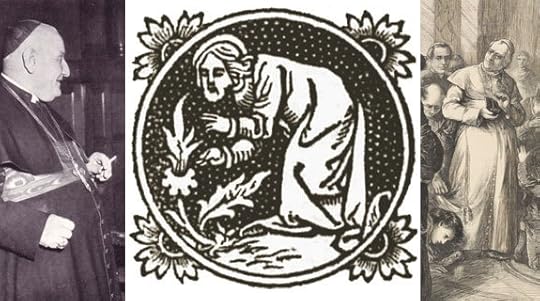
In the Habit: A History of Catholicism and Tobacco
| John B. Buescher | Catholic World Report
Saints who smoked, popes who puffed, and others who snuffed.
Ad Maioram Dei Gloriam Sold to American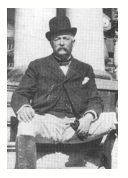 In 1873, impoverished Confederate veteran Chiswell Langhorne (left)
In 1873, impoverished Confederate veteran Chiswell Langhorne (left)
moved his family from Lynchburg to Danville, Virginia and began looking for
work. The owner of a Danville tobacco warehouse had recently developed a new
system of selling tobacco by auction: Instead of having farmers’ tobacco
hogsheads sampled for interested buyers, the warehouse owner had all the
tobacco laid out in long rows for auction. Langhorne, a lively character with
a taste for showing off, got the idea that he would make his mark somehow in
the newly flourishing Danville tobacco trade.
He was an Episcopalian, but while visiting a Catholic friend
in Richmond around this time, he attended Mass with him one Sunday morning and
heard the priest’s Gregorian chant. Langhorne “reasoned that maybe he could
supply the entertainment needs of warehousemen back home by emulating the
priest’s stimulating chant, along with what he later coined, a ‘pitter-patter’
and ‘gobble gook’ that would stimulate the buyers and be pleasing to the
gathering public.”
He added his own rhythmic body language and thereby created
a fast-paced and entertaining auctioneering chant that allowed buyers moving
along the rows of tobacco to track the rapid progress of the sales. It served Langhorne well, as it has the generations of
It served Langhorne well, as it has the generations of
tobacco auctioneers that came after him, each one adding his own style. After
his auctioneering success brought Langhorne some money, he began investing in
the railroads that transported the tobacco from Danville, left the
auctioneering business, and eventually made a fortune, allowing his family to
move to an estate near Charlottesville and work itself back into the Virginia
aristocracy. His daughter Irene married illustrator Charles Dana Gibson and
became the model for his Gibson girl drawings, and his daughter Nancy married
Waldorf Astor in England, was elected to Parliament, converted from the
Episcopal Church to Christian Science, and became virulently anti-Catholic,
despite the fact that, as we may say, her family’s success wound back, like a
twist of tobacco, to her father’s having heard Gregorian chant one Sunday at
high Mass. (Right: Danville auction warehouse postcard, 1946)
Ex Fumo Dare Lucem
At the time just after Spanish explorers were introduced to
tobacco by way of Columbus’ voyages, smoking or snuffing it—as the New
World natives did—carried with it something of an air of deviltry because
natives saw in it a connection to invisible spirits. To some of the most earnest
missionary clergy, the wreaths of its smoke and its action upon the spirits of
those who imbibed it were a kind of sacramental parody of the Church’s
sacraments, established in the New World beforehand by the Devil in order to
hinder its evangelization.
November 23, 2012
The Introduction to "Christianity, Islam, and Atheism" by William Kilpatrick
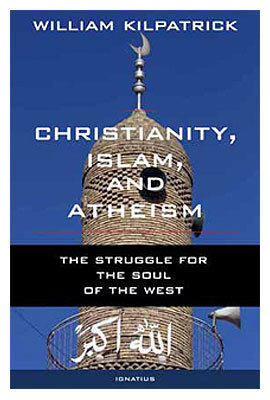 Christianity, Islam and Atheism: The Struggle for the Soul of the West
by William Kilpatrick
Christianity, Islam and Atheism: The Struggle for the Soul of the West
by William Kilpatrick• Also available in Electronic Book Format
Christians in the Muslim world face daily persecution. In some places they are
threatened with extinction. Will Christians in Europe and America someday find
themselves in the same precarious position that Christians in Egypt, Pakistan,
and Iraq now occupy? That will depend on whether they wake up and defend their
freedom while they still can.
Muslim persecution of Christians has increased dramatically in recent years.
One of the main reasons for this is that, in failing to understand Islam, Western
countries have helped to unleash the antagonism toward non-Muslims that lies at
the heart of the Islamic faith. For the better part of the twentieth century,
secular, despotic governments in the Middle East and in other Muslim regions
acted as a restraining force on the more violent manifestations of Islam. Then,
starting with the ouster of the shah of Iran in 1979, the situation began to
change. Secular strongmen were pushed aside or eliminated, and traditional
Islam was able to reassert itself. Western nations played a large part in this
transformation. They encouraged, supported, and sometimes actively participated
in the overthrow of autocratic rulers with the naïve confidence that democracy
would usher in an “Arab Spring”, that is, a blossoming of human rights and
liberties. But the overthrow of the shah in Iran, of Hussein in Iraq, of
Mubarak in Egypt, and of Gadhafi in Libya didn’t have the expected
result—neither did free elections in Gaza, Lebanon, and Turkey. Many Muslims in
the Middle East, North Africa, and parts of Asia have become more radicalized
and more dangerous, with the result that the future of the non-Muslim
population in those areas hangs by a thread. Christians in many predominately
Muslim regions now live in a nightmare world of beatings, abductions, rape,
imprisonment, torture, looting of shops, and burning of churches.
“My people are destroyed for lack of knowledge”, said the prophet Hosea (Hos
4:6). Western lack of knowledge about Islam is not the only reason Christians
in the East are being destroyed, but it is a contributing factor. A basic
knowledge of Islam would include the fact that it requires the ultimate
subjugation of other religions. Moreover, even a cursory glance at Islam’s
founding document, the Koran, reveals a pronounced disdain for non-Muslims. One
of the main reasons for Western ignorance of these facts is that they conflict
with one of the most cherished of contemporary Western beliefs: the belief in
the benefits of cultural diversity. Paradoxically, this belief rests on a
deeper conviction that differences between peoples are in reality only surface
phenomena—that although cultures and religions appear to be diverse, they are
actually very much the same. Although Islam appears to be different, it must,
according to this view, be just like other religions. What appear to be
differences are only misunderstandings, and facts that don’t support this claim
are routinely ignored or suppressed. For this reason, most of the atrocities
committed against Christians by Muslims receive very little media attention.
When the facts can’t be ignored, they are often misrepresented. Thus, attacks
on Christians by Muslims are described by the media as “sectarian strife” or as
“clashes” between Christians and Muslims.
A carefully guarded ignorance about Islam is widespread in the Western world,
and if Western citizens choose to remain in the dark, the problems faced by
Christians in Muslim lands could soon become our problems. Europe is already
well along the road to Islamization, due in part to immigration and high Muslim
birthrates, but also due to strictly enforced speech rules. In several European
countries, telling the truth about Islam is a crime. Although further behind,
America is on the same road as Europe. The extent of Islamic penetration of our
institutions is far greater than most Americans realize, but the mainstream
media, along with courts, universities, and various politicians, have been
quite willing to obscure this reality.
In some cases this suppression of the facts is conscious and deliberate, but in
many cases it’s the result of garden-variety group think. Journalists, for
example, tend to come from similar backgrounds and attend the same schools of
journalism. They belong to a circle of likeminded people among whom certain
thoughts are automatically affirmed, while others are automatically excluded.
Many of the information gatekeepers sincerely believe the propaganda generated
by Islamic apologists because it fits comfortably into their pre-existing
thought world. When it comes to covering Islam, they are club reporters, not
cub reporters. As Rifqa Bary said to a group of reporters covering her story,
“You guys don’t understand.” She might more accurately have said, “You won’t
understand.”
Who is Rifqa Bary? That her story received only grudging coverage might serve
as an illustration of how effectively negative information about Islam is
controlled. Bary, a Muslim girl living with her parents in Ohio, had secretly
converted to Christianity at the age of fifteen. When her parents discovered
the truth two years later, Bary, fearing for her life, fled to Florida, to the
home of a Christian pastor and his wife with whom she had been in
communication. A court battle ensued and eventually resulted in her return to Ohio,
but not to her parents. Rather, she was put under the protection of Ohio social
services until she reached eighteen, the age of legal emancipation.
Much of the court battle revolved around the question of whether Bary was in
any danger from her parents. Her defense argued that Islamic law requires the
death penalty for apostates and that her parents would be expected to carry out
the execution in order to cleanse their honor. This is what Bary tearfully told
Florida reporters:
I don’t know if you know about
honor killing. . . . You guys don’t understand. Islam is very different than
you guys think. They have to kill me. My blood is now halal, which means that because I am now a Christian, I’m
from a Muslim background, it’s an honor. If they love God more than me, they
have to do this. And I’m fighting for my life, you guys don’t understand. You
don’t understand.
Most of the media coverage, however, suggested that Bary was
the one who had misunderstood her religion, that what she asserted couldn’t possibly
be the case. Her claim flew in the face of the established narrative that Islam
was a religion of peace and justice. The murder of apostates simply didn’t fit
into the narrative.
If the reporters covering the case had done their homework, they would have
discovered that there is an almost universal consensus among Muslim scholars
that male apostates must be killed, although many Muslim authorities hold that
female apostates need only be imprisoned until they repent and reconvert. Bary
was aware of the lesser punishment, but she also knew that Islamic law allows
Muslim men to take matters into their own hands when it comes to their wayward
daughters. “Either they do that [kill me],” she said, “or they send me back to
Sri Lanka. There is an asylum there where they put people like me.”
Even though the killing or imprisoning of Muslim converts to Christianity has
become more and more common in Muslim communities, the plight of Rifqa Bary
didn’t fit into the prevailing consensus about Islam, so the majority of
reporters decided to frame the story in terms with which they were more
familiar. Thus, after the story was processed through the media’s mental
sorting machine, Rifqa Bary was cast as an over-excitable American teenager who
had a squabble with her parents and ran away from home. Multiply the
misreporting of Bary’s story a thousand times, and you’ll have a rough idea of
the amount of distortion and misinformation that surrounds one of the main
issues of our time.
This book is intended, in part, as a wake-up call. That in itself is revealing.
It’s amazing that eleven years after 9/11 and eighteen thousand terrorist
attacks later, wake-up calls are still needed. Yet the majority of people in
the West still do not seem to have grasped the supremacist nature of Islam, let
alone the threat it poses to them.
What is it that has served to delay that awakening? As I’ve said, part of the
responsibility lies with the Western faith in cultural equivalence. Any
evidence that Islam is markedly warlike and intolerant would undermine the
doctrine that all cultures and religions are roughly equal. Consequently,
Western societies have ignored and even suppressed the facts about Islam and
the important differences between it and Christianity.
Unfortunately, many Christians have also fallen into the habit of ignoring the
differences. The Islamic faith is founded on a blunt rejection of basic
Christian beliefs, but you would hardly know it from reading official Church
statements or from listening to leading prelates. Instead of informing their
flocks that Islam rejects Christ and requires its faithful to work toward the
eventual subjugation of Christians, many Christian leaders have been more
intent on emphasizing the common ground that Christians and Muslims share. For
example, the Second Vatican Council’s declaration Nostra Aetate focuses almost exclusively on the similarities
between Muslims and Christians. That approach was in keeping with the spirit of
change and openness that marked the Council; moreover, it seemed to fit with
the prevailing circumstances in the Muslim world at the time. The search for
shared beliefs and values arose at a time when the militant side of Islam was
kept firmly in check by secular rulers. But it now seems that the Islamic world
the Council Fathers were familiar with was an aberration—a brief departure from
the path laid out by Muhammad when he called for Muslims to make the whole
world submit to Allah.
During the 1960s, Westernized and secularized Egyptians could laugh along with
President Nasser when, speaking before a large assembly, he related how, years
earlier, a Muslim Brotherhood leader had demanded that he enforce the wearing
of the hijab, the head scarf traditionally worn by Muslim women. Nasser
replied, “Sir . . . you cannot make one girl, your own daughter, wear it, and
yet you want me to go and make ten million women wear it?” Nasser’s remarks
brought a burst of applause and laughter from the audience; but, as is now
evident, the wearing of the hijab is no longer a laughing matter in Egypt, and
the Muslim Brotherhood, the butt of Nasser’s joke, is now the dominant
political force there.
Many Christians still hope that Muslims and Christians can unite in a common
front against atheism and aggressive secularism, but that spirit of cooperation
and mutual respect is not shared by many of Islam’s religious leaders. The
situation that prevailed in the Muslim world at the time of the Second Vatican
Council is rapidly disappearing. The face of Islam that now presents itself
very much resembles the supremacist religion that once threatened Christendom.
In light of this development, it now seems that the common-ground thesis is
overdue for a reexamination.
Tolerance needs to be balanced with justice, and justice seems to require that
Christians be provided with a fuller account of Islam—if for no other reason
than that their survival may depend on that knowledge. Although there is some
common ground between Christianity and Islam—as there is some common ground
among all religions—it might be wise to start looking at some of the profound
differences between the two faiths. For example, because jihad is not an
interior spiritual struggle as many have been led to believe, but rather a
serious obligation to subdue non-Muslims, a lot of Western Christians are going
to be woefully unprepared for the kinds of things that are already happening to
Christians in Egypt, Iraq, Iran, Pakistan, Malaysia, Indonesia, Nigeria, and
Sudan.
Being prepared is contingent on being informed, and many Western Christians are
no better informed about Islamic beliefs than the pundits and politicians who,
in the early months of 2011, predicted that an Arab spring was just around the
corner. But finding a fuller account of Islam can be challenging for Christians
because many authoritative Church sources are brief and incomplete. Take the Catechism
of the Catholic Church, for example. Its
statement about Muslims (it says nothing of Islam per se) is forty-four words in length, which is about
eighty words less than the warning label on a bottle of Tylenol, and it
contains no warnings, only the comforting assurance that “together with us they
adore the one, merciful God.” Well, yes, the Koran refers to God as “merciful”,
but Islam seems to have its own unique understanding of that word. For example,
textbooks for tenth graders in Saudi Arabia instruct them on how to cut off the
hand and foot of a thief (illustrations included) as prescribed in the Koran
(5:33, 5:38). It would be nice to think that this is only for the purpose of
giving students a feel for the way things were done in Muhammad’s day; but as a
matter of fact, amputations (along with beheadings) are conducted on a weekly
basis in public squares in Saudi Arabia. When the Saudis apply a procrustean
solution to the misfits in their society, they do so in the literal sense of
the term.
Christians have a procrustean problem of their own in regard to Islam. They
have developed a habit of trying to force Islamic beliefs to fit into a bed of
familiar and comfortable Christian assumptions. Thus, on the rare occasions
when Christians hear anything about Islam, they are likely to hear that Muslims
worship one God (just like us), that they hold to an Abrahamic faith (just like
us), that they revere Jesus (just like us), honor Mary (just like us), and
value the moral life (just like us). But trying to fit Islam into a
preconceived Catholic/ Christian format makes for a very rough fit, as I hope
to make clear in the following pages.
An excessive emphasis on tolerance and sensitivity has resulted in a dangerous
knowledge gap for Christians. Moreover, when Christians put tolerance above
justice, they harm not only themselves, but Muslims as well. Christians need to
ask whether the current conciliatory approach to Islam is just toward all those
Muslims who suffer under the barbarities of sharia law. As has often been
noted, the main victims of Islam are Muslims. Should Christians be more worried
about offending the sensibilities of some Muslims, or should they be concerned
about the men, women, and children who are oppressed by Islamic laws? Tolerance
is fine up to a point, but as Thomas Mann observed, “Tolerance becomes a crime
when applied to evil.”
One thing seems clear. It is well past time for Christians to throw off their
complacency and begin instead to think more deeply about what Islam is and what
is at stake if we allow it to take root in our societies. And if Christians
need to readjust their thinking, so too do Muslims. It is ironic that our
society, which believes so strongly in change, nevertheless insists on the
unchangeability of other people’s beliefs. It is one of the legacies of
multiculturalism that we have come to believe that our own culture is
infinitely malleable, while believing that non-Western cultures are immutable.
Because we think Muslim beliefs can never be changed, we never suggest that
they ought to be changed.
It seems time to chart a different course. Any adequate response to the threat
from Islam will require us to push Muslims to rethink their faith on the most
basic level. In this regard, critics of Islam tend to avoid the main question
in favor of secondary questions. The secondary questions are: Is Islam a
religion of peace? Is Islam compatible with modern values? Are women treated
fairly under sharia law? The main question is: Did Muhammad actually receive a
revelation from God? That is really the heart of the matter. As long as Muslims
believe that Muhammad received his marching orders from God, the Islamic jihad
will continue. But take away the divine mandate to subjugate everyone, and you
take away the rationale for Islam’s war against the world.
Because the driving force behind Islamic aggression is Islamic theology, we can
no longer afford to treat Islamic theology as a protected species. Paradoxically,
the best way to secure peace and, at the same time, to show our love for
Muslims is to instill doubts about Islam in the minds of Muslims. At the same
time, of course, we must make sure that we have something better to offer in
its place.
Muhammad said that he came as a “warner”. The pages ahead are a warning about
the threat from the religion he founded. But this book is intended to serve as
more than a wake-up call. Many others have discussed the dangers posed by
Islam, but not many say what can be done about it. In addition to analyzing the
threat, this book lays out the practical steps that both Christians and
non-Christians can take to push back against the spread of Islam. At the same
time, it offers guidelines for countering the efforts of Islam’s many enablers
in the West.
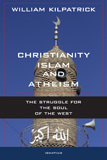 Christianity, Islam and Atheism: The Struggle for the Soul of the West
Christianity, Islam and Atheism: The Struggle for the Soul of the West
by William Kilpatrick
For many Americans the attack on the World Trade Center on September
11, 2001, was the first time they had considered Islam. Were the
terrorists motivated by the true dictates of their religion, or had they
hijacked Islam as well as the planes in a political cause unrelated to
the teachings of Muhammad?
Christianity, Islam, and Atheism argues that Islam is a
religion of conquest and subjugation and that in spite of 9 /11 and
thousands of other terrorist attacks throughout the world, many in the
West still do not know or admit this because it conflicts with their
multiculturalism and their belief in the equivalence of all cultures and
religions.
To meet the challenge from Islam, Christians need to know more about
the important differences between Islam and Christianity, yet many have
been lulled into complacency by the misleading and largely unexamined
assumption that the two religions are similar. The time that Christians
spend in pursuing common ground is time that Islamic activists will use
to press their radical agenda.
In addition to challenging both the multicultural and common-ground
approaches, William Kilpatrick also exposes the role played by atheists
and secularists in advancing Islam. Despite paying lip service to
freedom, radical secularists serve as enablers of radical Islam. The
civil liberties that the West enjoys are the fruit of Christian
civilization, Kilpatrick argues, and only a reawakened Christianity can
defend them against Islam's advance.
William Kilpatrick is the author of several books, including Psychological Seduction and Why Johnny Can't Tell Right from Wrong. His articles on Islam have appeared in Investor's Business Daily, FrontPage Magazine, Jihad Watch, Catholic World Report, the National Catholic Register, World,
and other publications. Professor Kilpatrick, who taught for many years
at Boston College, lectures frequently to audiences in the US and
abroad.
" Kilpatrick's insights into Western relativism, multiculturalism,
and the resultant anti-Christian attitudes form a matrix by which the
rot of a crumbling society can be better understood . . . This book
summons Christians to awaken their love for the true Jesus Christ of the
Gospel, to learn sober truth about Christianity and Islam, and live
their faith courageously in the face of Muslim aggression."
- Mitch Pacwa, SJ, Author, St. Paul and the Power of the Cross
"Most politicians, journalists, and intellectuals either fall silent
on the subject of Islamic theology or sanitize it through platitudes,
all of which revolve around religious and cultural relativism. As
William Kilpatrick convincingly shows in Christianity, Islam, and Atheism,
this fashionable complacency has compromised Western civilization. In
this indispensable book, he wakes the politically correct up from their
dogmatic slumbers, sounding a vitally important alarm about the true
aims of Islam."
-George Neumayr, contributing editor to The American Spectator and co-author of No Higher Power: Obama's War on Religious Freedom
"This extraordinary book pierces through the politically correct
miasma of unreality that envelops us and explains clearly and
persuasively, with mountains of evidence, the threat that Islam poses
today to the Church and to Western civilization. William Kilpatrick is
to be commended for penning a concise and comprehensive introduction to
the reality and magnitude of the Islamic supremacist threat. This book
should be essential reading for politicians, bishops, and everyone who
is on the front lines of the culture wars."
- Robert Spencer, author of the NY Times bestseller The Truth About Muhammad
20% off in preparation for Advent, plus newly released book, films, music
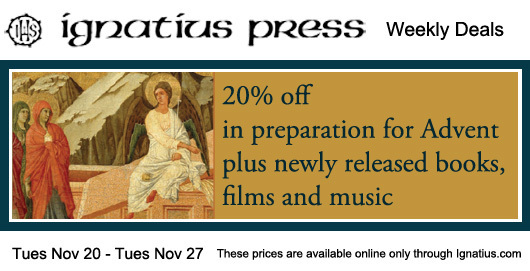
20% off in preparation for Advent, plus newly released Books | Offer ends Tuesday November 27th, 2012 at 12:00 midnight EST. These prices are available online only through Ignatius.com
Newly
released books by Milton Walsh, Msgr. William Smith and William
Kilpatrick are now available. The topics of these books range from the
threat of Islam, writings of the Fathers of the Church to
moral matters and all are so well-written, everyone should take
advantage of them at 20% off! Also available at this discount are books,
films and music to help prepare oneself for Advent. Whether you are looking for something for yourself, your children or a friend, we have something for everyone.
Dale Ahlquist LiveStream Available On-Demand – Did
you miss the Ignatius Press Nov. 15 LiveStream event featuring author
Dale Ahlquist? No worries; the event is available for viewing any time
on Ignatius Press’ LiveStream channel. Click here for an entertaining and informative look at G. K. Chesterton – The Complete Thinker.
Check
out our sale! Dozens of titles including books by Pope Benedict XVI,
novels, and art books at unbeatable prices are sure to make great
Christmas gifts. Click here for the full listing.
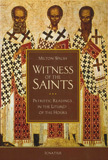 Witness of the Saints
Witness of the Saints
Patristic Readings in the Liturgy of the Hours
Milton Walsh
The writings of the Fathers of the Church have never been more
widely available, yet obtaining an exhaustive and user-friendly volume
of patristics can still be a daunting task. Milton Walsh has organized
these selections by topics according to the four pillars of the Catechism of the Catholic Church.
This fresh and original presentation of material that is literally at
the fingertips of anyone praying the Liturgy of the Hours can be a
tremendous aid to both religious devotion and theological study. Also available as an e-book.
Regular price: $34.95, sale price: $27.96
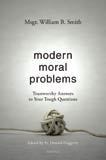 Modern Moral Problems
Modern Moral Problems
Msgr. William Smith
Modern Moral Problems addresses moral quandaries that can
beguile and confuse faithful Catholics. Written in a
question-and-answer format, the book covers questions regarding
sexuality, medical ethics, business practices, civic responsibilities,
and the sacramental life of the Church. The extraordinary assortment of
issues-forming a single, organized collection-is a valuable reference
for anyone seeking clear and concise answers to tough moral questions. Also available as an e-book.
Regular price: $18.95, sale price: $15.16
 Christianity, Islam and Atheism
Christianity, Islam and Atheism
William Kilpatrick
Christianity, Islam, and Atheism argues that Islam is a
religion of conquest and subjugation and that in spite of 9 /11 and
thousands of other terrorist attacks throughout the world, many in the
West still do not know or admit this because it conflicts with their
multiculturalism and their belief in the equivalence of all cultures and
religions. The civil liberties that the West enjoys are the fruit of
Christian civilization, Kilpatrick argues, and only a reawakened
Christianity can defend them against Islam's advance. Also available as an e-book.
Regular price: $24.95, sale price: $19.96
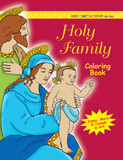 Holy Family
Holy Family
Coloring Book
Katherine Sotnik
Lovely line drawings based on paintings by great masters grace
every page of this coloring book. Accompanying each image is a quotation
from the Holy Bible. Children will learn about the Holy Family: Jesus,
Mary, and St. Joseph. A wonderful way to introduce your children to the
Holy Family!
Regular price: $4.95, sale price: $3.96
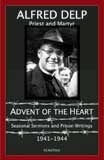 Advent of the Heart
Advent of the Heart
Alfred Delp
Fr. Alfred Delp,S.J., was a heroic German Jesuit priest who was
imprisoned and martyred by the Nazis in a Nazi death camp in 1945. While
in prison, Fr. Delp was able to write a few meditations found in this
book, which also includes his powerful reflections from prison during
the Advent season about the profound spiritual meaning and lessons of
Advent, as well as his sermons he gave on the season of Advent at his
parish in Munich. Also available as an e-book.
Regular price: $14.95, sale price: $11.96
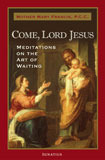 Come, Lord Jesus
Come, Lord Jesus
Mother Mary Francis, P.C.C.
These Advent reflections by the abbess of a Poor Clare monastery,
an accomplished spiritual writer, focus our attention on the coming of
Jesus into our lives. There is a double movement to this coming; both
our active preparation to be ready for him and our patient waiting for
the Lord to arrive in his own good time. Also available as an e-book and audio download.
Regular price: $15.95, sale price: $12.76
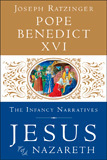 Jesus of Nazareth: The Infancy Narratives
Jesus of Nazareth: The Infancy Narratives
Pope Benedict XVI
The momentous third and final volume in the Pope's international
bestselling Jesus of Nazareth series details the stories of Jesus'
infancy and boyhood, and how they are relevant today in the modern
world. The root of these stories is the experience of hope found in the
birth of Jesus and the affirmations of surrender and service embodied in
his parents, Joseph and Mary.
Regular price: $20.00, sale price: $16.00
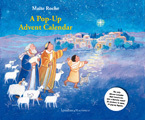 A Pop-Up Advent Calendar with Booklet
A Pop-Up Advent Calendar with Booklet
Maite Roche
This brightly illustrated Advent calendar changes day by day into a
multi-dimensional Nativity scene. Beginning the first of December and
continuing through the big feasts of the Christmas Season, children can
open a window each day to reveal a new detail or a new character of the
Nativity scene.
Regular price: $10.99, sale price: $8.79
He Comes! He Comes!
Advent is the sacred season of anticipation and expectation in
which we prepare for the coming of our blessed Savior. To live Advent is
to live in an awareness of a Presence that changes our lives. The
Magnificat Advent Companion is a rich spiritual guide that will
accompany you daily through the 4 weeks of this holy season. It provides
original daily reflections based on the Scriptures of the Mass for each
day of Advent written by some of the finest Catholic writers in the
world.
Regular price: $3.95, sale price: $3.16
Seek that Which is Above
Joseph Cardinal Ratzinger
In this beautifully illustrated book, Joseph Ratzinger (Pope
Benedict XVI) gives us profound meditations on what our life in Christ
should be like as it is lived through the various Seasons and Feasts of
the liturgical year. This book also includes thoughts on other spiritual
and secular themes such as the true nature of peace, why it is
difficult for so many to experience joy, the relationship between spirit
and matter, vacation and rest, etc. Also available as an e-book.
Regular price: $14.95, sale price: $11.96
Films
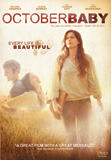 October Baby
October Baby
As the curtain rises, Hannah hesitantly steps onto the stage for
her theatrical debut in college. Yet before she can utter her first
lines, Hannah-unscripted-collapses in front of the stunned audience.
After countless medical tests, all signs point to one underlying factor:
Hannah's difficult birth. This revelation is nothing compared to what
she then learns from her parents: she was actually adopted ... after a
failed abortion attempt. Hannah joins her friend Jason and his group of
friends on a Spring Break road trip, embarking on a journey to discover
her hidden past ... and find hope for her unknown future.
Regular price: $17.95, sale price: $14.36
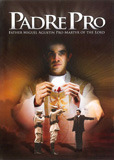 Padre Pro
Padre Pro
This movie is the inspiring story of the famous Father Miguel Pro,
S.J., who was executed in Mexico in 1927 for the crime of being a
Catholic priest. This young Jesuit spent most of his short life in the
priesthood dodging the Mexican police as he ministered to the
underground Church during the Mexican Revolution. Fr Pro's quick wit and
keen sense of humor were put to good use as he pedaled around Mexico
City on his bicycle in various disguises, en route to administering the
Sacraments, giving spiritual talks or begging food and money for the
poor. But behind the disguises beat the heart of a Saint - as the
Mexican people testified by turning out in throngs to pay their last
respects after his martyrdom.
Regular price: $14.95, sale price: $11.96
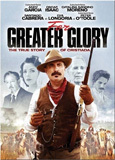 For Greater Glory
For Greater Glory
What price would you pay for freedom? In the exhilarating action epic For Greater Glory
an impassioned group of men and women each make the decision to risk it
all for family, faith and the very future of their country, as the
film's adventure unfolds against the long-hidden, true story of the
1920s Cristero War the daring people's revolt that rocked 20th Century
North America.
Regular price: $26.95, sale price: $21.56
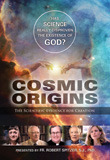 Cosmic Origins
Cosmic Origins
Cosmic Origins explains what we know about the beginning
and nature of the universe, as well as its transcendent implications in
clear, easy-to-understand terms. The film weaves together a compelling
narrative from academics and credentialed scientists pointing toward a
very Christian understanding of how the universe came to exist.
Regular price: $19.95, sale price: $15.96
Brother Francis
Don't miss this new, fun-filled, animated series for Catholic kids! Employing a variety of
animation styles, catchy songs and engaging stories, the Brother
Francis series will be one your children will enjoy and learn from as
they watch it over and over. Wonderful and wholesome family
entertainment!
Let's Pray! A Lesson on Prayer
Regular price: $12.99, sale price: $10.39
The Bread of Life: Celebrating the Eucharist
Regular price: $12.99, sale price: $10.39
The Rosary: A Special Way to Pray
Regular price: $12.99, sale price: $10.39
Forgiven! The Blessings of Confession
Regular price: $12.99, sale price: $10.39
Music
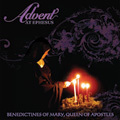 Advent at Ephesus
Advent at Ephesus
The first of its kind for the Advent season, this gorgeous
recording captures in song the spirit of hope and expectation of Advent.
This unique CD is recorded by the Benedictines of Mary, Queen of
Apostles, a young, monastic order of Sisters located in rural Missouri,
dedicated to prayer and chant. Advent at Ephesus includes an amazing
variety of traditional Latin and English hymns, polyphony, Gregorian
Chant, medieval harmonies and an original piece to prayerfully lead you
through the sacred Advent season in preparation for Christmas. 17 Hymns
total.
Regular price: $17.95, sale price: $14.36
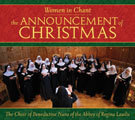 The Announcement of Christmas
The Announcement of Christmas
Women in Chant
The nuns of the Abbey of Regina Laudis are back, bringing
listeners a rare opportunity to experience the “original” Christmas
music of the monastic tradition.The Announcement of Christmas
carries listeners through the different phases of the season: the four
weeks of Advent, Christmas Eve, Christmas Day, and finally the Epiphany.
With selections that range from majestic ensembles to stunning solo
pieces, a musical masterpiece that at once thrills the ears and opens
the heart to the birth of Christ.
Regular price: $17.95, sale price: $14.36
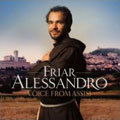 Voice from Assisi
Voice from Assisi
Friar Alessandro
After years of searching for "The Next Great Italian Tenor",
Universal Music surprisingly discovered an amazing young Franciscan
Friar, Alessandro Brustenghi, who lives in the same friary founded by
St. Francis of Assisi. this unique and inspirational sacred hymns album
truly combines the best of the old (or ancient) and the new, featuring
such classic hymns as Panis Angelicus, Tantum Ergo plus 9 other hymns.
Regular price: $15.95, sale price: $12.76
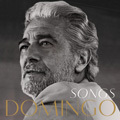 Songs
Songs
Placido Domingo
The beloved tenor fulfills a long desire to record an album of
famous songs that accompanied his life. Domingo invited world-renowned
artists for duets including Josh Groban, Harry Connick, Susan Boyle, Chris Botti, and Katherine Jenkins. Songs include Time After Time, Come What May, Besame Mucho, Eternally, The Girl from Ipanema, What a Wonderful World and eight more.
Regular price: $16.95, sale price: $13.56
Heavenly Christmas
Jackie Evancho
Heavenly Christmas is young Jackie's first full-length Christmas
album, picking up where her first holiday record, the chart-topping EP O Holy Night,
left off. On this new album, Jackie performs a collection of
heart-warming, beloved traditional Christmas carols that have a fresh
new take with her amazing angelic voice.
Regular price: $14.95, sale price: $11.96
More Sublime Chant
A sequel to the best-seller, Sublime Chant, Richard Proulx
and his Cathedral Singers present another exquisite selection of
glorious sounds of sacred music from the past in this inspiring album of
Gregorian, Ambrosian and Galician chant. The 32 hymns include chants
for Advent, Christmas, Lent and Easter, two Mass settings, favorites
like Panis Angelicus, O Bendicamus Domino, Alma Redemptoris Mater, and many more.
Regular price: $16.95, sale price: $13.56
Catholic World Report
Vladivostok Mission Celebrates Its 20th Anniversary
by Jim Graves
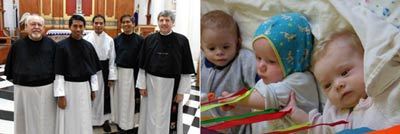
The Catholic mission in Vladivostok, Russia brings the light of Christ to a poverty-stricken and highly secularized region.
In 1992, Father Myron Effing and Brother (now Father) Daniel Maurer,
two Americans from the Midwest, felt called to serve the Russian people.
They went to Vladivostok, a city in Far Eastern Russia with about
600,000 people, and founded the Canons Regular of Jesus the Lord and the
Mary Mother of God Mission Society to support their work. Although
re-establishing the Faith has been challenging in a society that has
been thoroughly secularized, the work of the priests has flourished in
the 20 years since the Vladivostok mission was founded, and the future
looks promising.
Homiletic & Pastoral Review
Biblical Foundations and the Thread of History
by Brian Jones
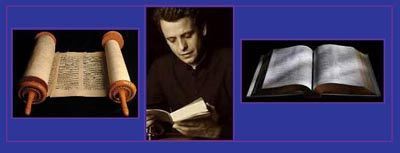
Current trends reveal a distinct blindness about the essence of Sacred Scripture.
Current trends, that have existed in biblical scholarship for quite
some time, reveal a distinct blindness about the essence of Sacred
Scripture. The Enlightenment philosophy of the 17th and 18th centuries,
along with the rise of the historical-critical method, has led the
so-called biblical scholars to view Scripture in a manner not seen
before. No longer is Scripture understood as the Word of God, given
through the mediation of divinely inspired human authors, for the
salvation of the world. How many professors of Scripture (also widely
known as professors of religious studies) would say that Scripture is
divinely inspired, and free from error? I would imagine questions such
as these would not come into the consciousness of those professors.
Modern biblical scholarship tells us that Scripture must be viewed
through the lens of skepticism, putting aside fanciful stories of
Christ, and attempting to zero-in on the historical Jesus.
November 21, 2012
40% off Dan Nicholls' "Employee Pick of the Week"

40% off Dan Nicholls' Pick of the Week*
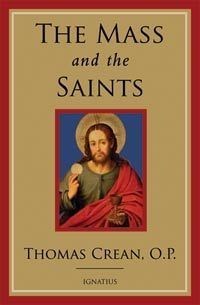 If
Ifyou're like me, the ideal book to spend time alone with is
contemplative, quiet where everyone shouts, deep, inviting because it is
based in beauty, and reassuring because it proceeds with a sense of joy
and timelessness, full of that thing St. Thomas says unites poets and
philosophers: wonder. That book, ideal though it may be, has some
reality in Thomas Crean's The Mass and the Saints , which is why it's my recommendation to you.
Holy Mass has had its commentators pretty much from the beginning.
Something so central to Christian life must inspire discussion and art,
and a sort of practical theology gleaned from the liturgy itself. What
does it mean that we (traditionally) face the East? Why does the priest
elevate the host instead of, say, hiding it away or consuming it
immediately? What do these things tell us about God and about us? These
are the sort of questions approached in this book--not like a Q&A,
but like a tour through the Mass with saints and other writers from its
2000 years of history that have been fixed on the celebration of the
Eucharist with eyes open to, as Fr. Crean puts it, the "literal and
mystical meaning of the Mass".
A Dominican friar at Cambridge, Fr. Crean knows the value of
contemplation mixed
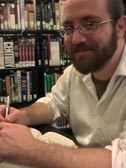 with action, and that's the aspect of this book that
with action, and that's the aspect of this book thatreally caught hold of me. I savored it over weeks, and would look
forward to immersing my mind, after a hard day's work, in the many
layers of meaning that the source and summit of Christian life has to
offer. It's a thing to wonder at. The Mass and the Saints is also available as an e-book.
Dan
Nicholls handles a number of websites for Ignatius, like Ignatius
Critical Editions and Homiletic & Pastoral Review. He is a happy
graduate of Campion College ('04, AA) and Ave Maria University ('07,
BA), and lives in Arizona.
*Employee
Pick of the Week program features savings of 40% off a book, movie, or
compact disc personally chosen and recommended by an Ignatius Press
employee.
Islam’s Rise and the West’s Denial
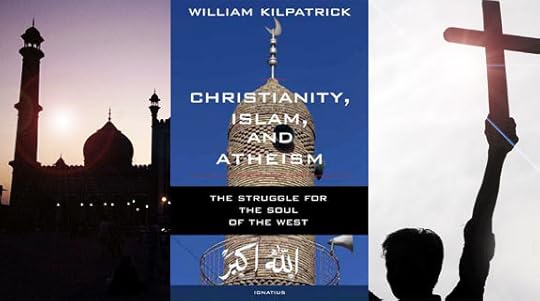
Islam’s Rise and the West’s Denial | CWR Staff | Catholic World Report
William Kilpatrick on what the spread of militant Islam means for the future of the West.
William
Kilpatrick is an author and lecturer who taught for many
years at Boston College and whose articles on Islam have appeared in numerous
publications, including Investor's Business Daily, FrontPage Magazine, the National
Catholic Register, and World magazine. He has written several
books, including Psychological
Seduction and Why
Johnny Can't Tell Right from Wrong, and his most recent book, Christianity,
Islam and Atheism: The Struggle for the Soul of the West, will be released next week from Ignatius
Press. Kilpatrick recently spoke with Catholic World Report about Islam and its growing significance for
the West.
CWR: You begin by noting that, yes, there is some common
ground between Christianity and Islam, but the differences are far more
important. What are the most important differences between the two religions?
William Kilpatrick: Beneath the surface similarities lie important and largely
irreconcilable differences. Islam rejects the Trinity, the Incarnation, the
Crucifixion, and the Resurrection. In fact, associating partners with Allah—as
Christians do—is considered the very worst sin. Chapter nine, verse 30 of the
Koran says, “the Christians call Christ the son of Allah…Allah’s curse be on
them: how they are deluded away from the truth.” Moreover, the God of the Koran
bears little resemblance to the God worshipped by Christians and Jews. Although
he occasionally expresses solicitude for Muslim widows and orphans, he shows
little in the way of mercy, compassion, or justice, and he appears to hate
non-Muslims with a vengeance. The Koran is full of lurid descriptions of the
fate that awaits unbelievers in hell.
The two faiths also differ sharply
in their vision of paradise. Heaven for Christians means union with God and the
fellowship of the saints. For Muslims heaven means union with 72 “high-bosomed”
and eternally youthful virgins. That’s for males, of course; the Koran is
unclear about what sort of heaven women will enjoy. These differing views of
paradise have very serious practical implications in the here and now. The
Islamic version of paradise creates quite an incentive for young men to try to
get there as quickly as possible. And, according to Islamic tradition, the only
sure route is by “killing and being killed in the cause of Allah.” Take Mohamed
Atta. Due to an airline mistake his luggage was left behind in Boston on the
day of the 9/11 flight. When authorities later opened it they found a wedding
suit, a bottle of cologne, and a letter expressing his anticipation of marriage
to his 72 heavenly wives. As Richard Weaver wrote, “ideas have consequences.”
CWR: The Second Vatican Council and the Catechism of the
Catholic Church mention Islam briefly and rather positively. Otherwise,
there isn’t much in the way of official Church statements on Islam. Why is
that? Is there a need for such?
Kilpatrick: Nostra Aetate, the
Second Vatican Council’s declaration on the relation of the Church to
non-Christian religions, includes two short paragraphs sketching out several
commonalities between Christians and Muslims. It must be remembered, however,
that finding commonalities was precisely the task set forth in the initial
paragraph of the declaration: “She [the Church] considers above all in this
declaration what men have in common….” In light of this and in view of its
brevity, Nostra Aetate can hardly be
considered to be the Church’s final word on Islam—although some Catholics have
taken it to be just that. The statement about Muslims in the Catechism is even shorter—only 44
words—and merely echoes Nostra Aetate’s observation that both Christians and
Muslims worship the One God.
How do you account for this
minimalist treatment? The probable answer is that at the time of the Vatican
Council, militant Islam was fairly quiescent, and the Church fathers were far
more concerned with the threat from atheistic communism. Now that Islam is once
again set on subjugating the rest of the world, Catholics need to be given a
fuller picture of Islam, if for no other reason than that their survival may
depend on it. Catholics and other Christians have been lulled into complacency
by the simplistic notion that Christians and Muslims share much in common. For
example, when a Catholic reads that Muslims worship the same God and revere the
same Jesus he does, he might easily jump to the conclusion that Islam is really
a religion of peace and that terrorists are “misunderstanders” of their Islamic
faith. That is a very naïve view to hold in these very dangerous times.
CWR: “This book,” you write in the introduction, “is intended, in part,
as a wake-up call.” What is the Western world missing? And, more specifically,
what are Catholics missing when it comes to rightly gauging and studying Islam
today?
Continue reading at www.CatholicWorldReport.com.
November 20, 2012
New: "Witness of the Saints: Patristic Readings in the Liturgy of the Hours"
Now available from Ignatius Press:
Witness of the Saints: Patristic Readings in the Liturgy of the Hours

by Milton Walsh
• Also available in Electronic Book Format
The writings of the Fathers of the Church have never been more widely
available, yet obtaining an exhaustive and user-friendly volume of
patristics can still be a daunting task. Without realizing it, many
priests, seminarians, members of religious communities, and even laity
already own a patristic library-their Liturgy of the Hours.
In the four volumes of the Liturgy of the Hours, the official daily
prayer of the Catholic Church, there are nearly 600 selections from the
writings of Fathers and saints. Seeing the potential of this vast
collection as a theological resource, Milton Walsh has organized these
selections by topics according to the four pillars of the Catechism of the Catholic Church.
This topical concordance allows the reader to compare what the various
authors have written on the same themes, while a chronological timeline
of the readings shows their relationship to each other in time.
Walsh has also provided background on the liturgical celebrations of the
Church, as well as historical information on each author. In addition,
there is a chapter on how patristic readings can assist in understanding
the Bible.
This fresh and original presentation of material that is literally at
the fingertips of anyone praying the Liturgy of the Hours can be a
tremendous aid to both religious devotion and theological study.
Milton Walsh holds a doctorate in Sacred Theology from
the Gregorian University in Rome. For many years he taught theology at
St. Patrick's Seminary in Menlo Park, California, and from 1989 to 1997
was pastor of St. Mary's Cathedral, San Francisco. He is the author of In Memory of Me: A Meditation on the Roman Canon and Second Friends: C. S. Lewis and Ronald Knox in Conversation.
"Recently the Holy Father devoted time in each of his Wednesday
audiences to explaining to the pilgrims who came to Rome the importance
of the writings of the Fathers of the Church and the saints in the life
of each believer today. Pope Benedict taught them that the true teaching
of the Church is not "invented by intellectuals," it is not something
that "goes beyond the Church's simple faith." No. The true Gospel is
the one imparted by the Bishops, in communion with the Bishop of Rome,
who have received this teaching in an uninterrupted line from the
apostles. We all owe a debt of gratitude to Milton Walsh who, in his
collection Witness of the Saints, has painstakingly arranged
important quotations from the patristic lectionary of the Prayer of the
Hours (Office of Readings) in such a way that this treasure of the
writings of the Fathers and saints that both inspires and informs is now
conveniently and immediately accessible to all. Preachers, teachers,
parents - all of the faithful who desire to drink from the fountain of
true wisdom and to share this life giving nourishment with others will
want to keep this volume close at hand. Witness of the Saints
is a valuable tool to help all of us "think with the Church" (sentire
cum Ecclesia), after the heart and mind of our Holy Father, Pope
Benedict XVI."
- Father Samuel F. Weber, O.S.B.
"As usage of the Liturgy of the Hours increases among members of the Church, Witness of the Saints: Patristic Readings in the Liturgy of the Hours
provides a timely exposition of the rich heritage available in the
Church's Prayer. A concise, informative, and well written history of the
Liturgy of the Hours serves as introduction to a valuable selection of
passages from the Fathers and the saints, taken from the Office of
Readings and arranged in accordance with the Catechism of the Catholic Church.
We can be most grateful to Milton Walsh for this outstanding volume of
invaluable resources that will enlighten and inspire readers for years
to come."
- Abbot Gregory J. Polan, O.S.B.
"We never pray alone. When we pray, we are in heaven with the Fathers
and the saints. They are our contemporaries and our close companions.
This book opens our eyes, hour after hour, to that splendid reality.
Working with the saints, Milton Walsh can change the way you experience
the Church's prayer."
- Mike Aquilina
"The Office of Readings is one of the deepest treasures in the Church's
liturgical prayer, but one of the least appreciated. Who are the people
who wrote these reflections? Didymus the Blind? Faustinus Luciferanus?
John the Serene of Naples? Hedwig? Gertrude? Milton Walsh introduces you
to these people as if he has been friends with them for years. He has.
And now so can you."
- Fr. Paul Turner, Former President of the North American Academy of Liturgy
Carl E. Olson's Blog
- Carl E. Olson's profile
- 20 followers


